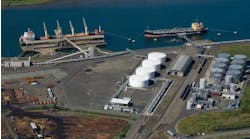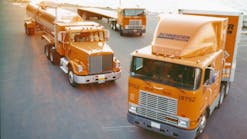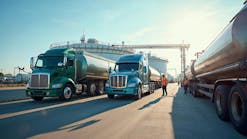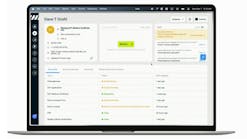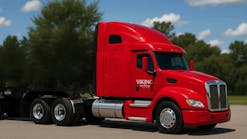Transporting bulk materials, whether liquid or solid, is critical to many industries, from agriculture to chemicals, oil, and construction. Unlike standard freight, bulk materials present unique safety, efficiency, and cost challenges. Bulk materials vary greatly in physical form, from powders and granules to liquids and slurries. Each type requires specific handling and containment methods to prevent spillage, contamination, or degradation during transit.
- Solid bulk materials, such as grains, coal, and ores, require open or covered transport in bulk trailers or railcars. These materials must be protected from external elements like moisture, which can alter their weight or cause spoilage.
- Liquid bulk materials, including chemicals and fuels, require specialized tankers to contain and transport hazardous and non-hazardous liquids safely. The properties of the liquid, such as viscosity, temperature sensitivity, and volatility, must be accounted for when selecting the transport method.
- Powders and fine materials, such as cement or flour, require pneumatic trailers with air pressure systems to ensure they can be offloaded efficiently without contamination.
Adopting best practices in transporting bulk materials and utilizing technology like a transportation management system (TMS) means that materials are delivered on time, with minimal loss, and in compliance with regulatory standards. Here are key strategies and best practices that transporters can follow to optimize the transportation of bulk materials:
Complete visibility across multiple modes
The complexities of managing large volumes, varying physical properties, and regulatory compliance require specialized systems to ensure efficient, cost-effective, and safe transportation. A TMS allows shippers to streamline bulk transportation operations through real-time visibility, advanced analytics, and multimodal optimization.
Whether shipping liquid chemicals, agricultural products, or construction materials, shippers need to know the exact location and status of their shipments to avoid delays, minimize losses, and improve customer satisfaction. By always knowing the status of shipments, companies can proactively adjust plans, reroute shipments in case of disruptions, and provide accurate delivery estimates to customers. This visibility is crucial for bulk materials with tight delivery windows or that perish quickly, as it ensures the cargo reaches its destination in optimal condition.
Bulk materials are often shipped using multiple modes of transport, including trucks, railcars, barges, and ships. Coordinating multimodal transportation can be complex, particularly when transitioning between modes requires specialized equipment or handling procedures. A TMS that provides a single platform for managing all modes of transportation helps shippers orchestrate the entire shipping process, ensuring that each leg of the journey is timed perfectly to avoid delays and reduce empty miles.
Regulatory and safety compliance
When hazardous materials are involved, transporting bulk materials involves stringent regulations. Failure to comply with these regulations can lead to costly fines, legal issues, and potential environmental or public health harm. Bulk transporters must stay knowledgeable of the latest regulations and ensure all their permits, licenses, and certifications are current. A TMS can automate documentation, track permits, and monitor cargo conditions to ensure adherence to safety standards.
A TMS can automatically generate required shipping documentation for hazardous materials, such as material safety data sheets, and track the necessary certifications for drivers and equipment. This reduces the administrative burden on logistics teams and helps prevent costly errors that could lead to fines or shipment delays.
A TMS also helps mitigate risks by monitoring potential safety issues during transit. The TMS can detect anomalies in load conditions, such as temperature fluctuations in refrigerated tanks or pressure changes in liquid containers, and immediately alert drivers and logistics managers to take corrective action. This proactive approach to risk management ensures that bulk materials are transported safely and that potential hazards are addressed before they escalate into major incidents.
Utilizing proper equipment and technology
The right equipment is critical in ensuring that bulk materials are transported safely and efficiently. Investing in specialized trailers, tankers, or railcars can significantly reduce the risk of accidents, contamination, or spillage.
- Bulk trailers and tankers: The choice of equipment, such as dry bulk trailers, liquid tankers, or pneumatic tankers, depends on the nature of the material. Trailers should be regularly inspected and maintained to prevent leaks, mechanical failures, or contamination.
- Real-time tracking and monitoring systems: GPS tracking and advanced sensor technology allow shippers to monitor the condition of bulk cargo during transit. For example, temperature-sensitive materials such as food ingredients or chemicals can be equipped with sensors to track temperature, pressure, and other critical variables. This data feeds directly into a TMS, alerting users to any potential deviations from the required conditions, thereby reducing the risk of product degradation.
Using the latest technology ensures that bulk materials are transported with minimal risk while enhancing operations’ speed and efficiency.
Efficient load planning and capacity management
Optimizing load capacity is crucial to maximizing the profitability of bulk transport operations. Overloading vehicles can result in fines, increased wear and tear on equipment, and higher fuel costs. Underloading, on the other hand, reduces profitability and wastes resources.
- Proper weight distribution: Ensuring that bulk materials are evenly distributed within the container is essential to maintaining vehicle stability and preventing accidents. Uneven loads can cause trailers or tankers to become unstable, especially during transit over uneven terrain or sharp turns.
- Route optimization: Planning the most efficient route is another key factor in ensuring that bulk materials are delivered on time and at the lowest cost. Using a TMS that accounts for road conditions, traffic, and fuel stops can significantly improve delivery times and reduce costs. Route optimization helps to lower fuel usage, resulting in less carbon emissions, which helps the environment.
- Scheduling and coordination: Effective communication and scheduling between shippers, carriers, and receivers are vital to ensure that bulk materials are delivered on time without unnecessary delays. This is particularly important for perishable goods or materials with a short shelf life.
Maintaining cleanliness and preventing contamination
Maintaining cleanliness throughout the transportation process is paramount for certain bulk materials, such as food products, pharmaceuticals, or chemicals. Contamination can result in significant losses and legal liabilities.
- Cleaning and sanitizing: Bulk trailers and tankers should be thoroughly cleaned and sanitized between loads to prevent cross-contamination, especially when transporting food-grade or hazardous materials. Depending on the nature of the material, specialized cleaning processes, such as steaming or pressure washing, may be required.
- Sealed containers and tankers: Sealed and properly insulated containers help prevent exposure to external elements, contamination, or tampering during transit. Ensuring that lids, valves, and seals are functioning correctly is essential to maintaining the integrity of the cargo.
Training and safety protocols
Proper training for drivers and other personnel handling the materials is essential to ensure safety and efficiency.
- Drivers should be well-trained in the specifics of bulk material transport, including handling hazardous materials, proper load-securing techniques, and emergency procedures in case of accidents or spills. Continuous education and refresher courses are recommended to update drivers on the latest safety practices and regulations.
Transporting bulk materials presents unique challenges requiring careful planning, specialized equipment, and strict safety and regulatory standards. By following these best practices—understanding the material, complying with regulations, using a TMS, optimizing load management, maintaining cleanliness, ensuring driver safety, and considering environmental impact—transporters can streamline their operations, reduce costs, and ensure that bulk materials are delivered safely and efficiently.

